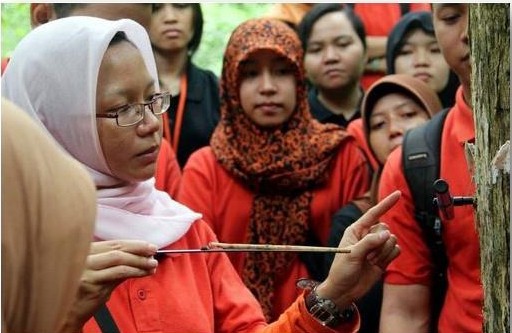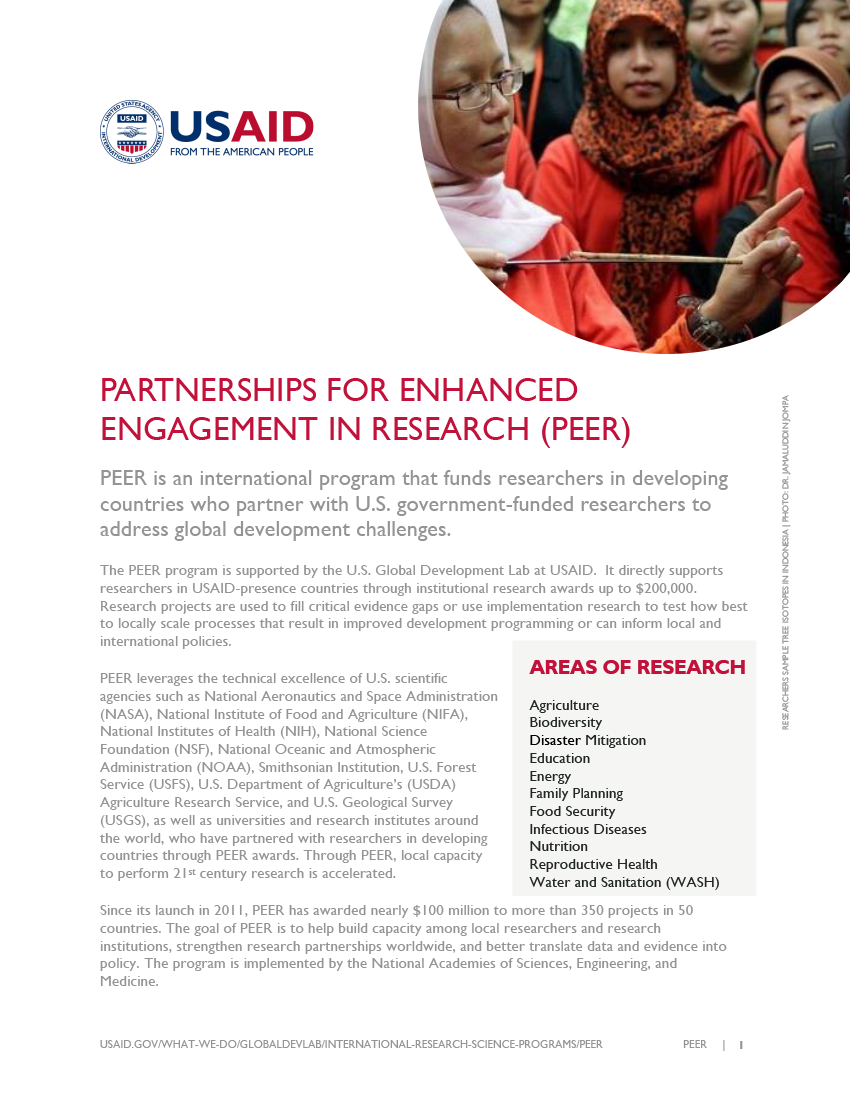Speeches Shim

PEER is an international program that funds researchers in developing countries who partner with U.S. government-funded researchers to address global development challenges.
The PEER program is supported by the U.S. Global Development Lab at USAID. It directly supports researchers in USAID-presence countries through institutional research awards up to $200,000. Research projects are used to fill critical evidence gaps or use implementation research to test how best to locally scale processes that result in improved development programming or can inform local and international policies.
PEER leverages the technical excellence of U.S. scientific agencies such as National Aeronautics and Space Administration (NASA), National Institute of Food and Agriculture (NIFA), National Institutes of Health (NIH), National Science Foundation (NSF), National Oceanic and Atmospheric Administration (NOAA), Smithsonian Institution, U.S. Forest Service (USFS), U.S. Department of Agriculture’s (USDA) Agriculture Research Service, and U.S. Geological Survey (USGS), as well as universities and research institutes around the world, who have partnered with scientists in developing countries through PEER awards. Through PEER, local capacity to perform 21st century research is accelerated.
Since its launch in 2011, PEER has awarded nearly $100 million to more than 350 projects in 50 countries. The goal of PEER is to help build capacity among local researchers and research institutions, strengthen research partnerships world-wide, and better translate data and evidence into policy. The program is implemented by the National Academies of Sciences, Engineering, and Medicine.
PEER One-Pager ![]() (pdf - 166k)
(pdf - 166k)
AREAS OF RESEARCH
Agriculture
Biodiversity
Disaster Mitigation
Education
Energy
Family Planning
Food Security
Infectious Diseases
Nutrition
Reproductive Health
Water and Sanitation (WASH)
EXAMPLES OF PEER PROJECTS
ENDANGERED WILDLIFE PROTECTION IN KENYA AND TANZANIA
Endangered wildlife traffickers use the tactic of obscuring the identity of bushmeat to successfully evade inspectors in Africa. Inspectors lack the evidence needed to prosecute the offenders despite suspicions of illegal activity. In partnership with the Kenya & East Africa Mission, the PEER program, Kenya Wildlife Services, and the Smithsonian Institution, three PEER teams have sequenced, catalogued, and documented the DNA of endangered wildlife and converted those sequences into easy to test “barcodes.” This work is done in collaboration with a sister team in Tanzania who is replicating this work locally. The database of DNA barcodes is being used by law enforcement agencies to prosecute traffickers using DNA evidence. There are now nationwide training campaigns among wildlife officials and courtroom prosecutors aimed at phasing in DNA testing procedures as standard practice.
FOREST FIRE POLICIES IN COLOMBIA
Tropical forest ecosystems host high levels of biodiversity and some of the greatest carbon stocks on the planet. Unfortunately, recent strong and frequent wildfires are degrading tropical forests, destroying biodiversity, and releasing massive amounts of carbon into the atmosphere. In order for the Colombian government to address these issues using science-based forest management policies, researchers need to better understand the relationship between fire, the structure of tropical forests, and its effect on carbon stocks. Researchers from the Universidad Nacional de Colombia have partnered with researchers from the University of Colorado, Boulder used remote sensing to develop models to predict how different types of forest structures respond to fire. These researchers are now disseminating their findings to the government to help policymakers develop science-based policies that ensure resilient and sustainable tropical forest ecosystems.
DISASTER PREPAREDNESS IN NEPAL
Nepal has an active “open mapping” community, citizen volunteers that add information to data-scarce maps in emerging economy countries. Nepal leveraged this capacity to better respond to natural disasters such as the 2015 earthquake. Given the importance of reliable maps during emergency situations, PEER is supporting research into how to best sustain and expand open mapping in Nepal. Through this research, Kathmandu Living Labs, a Nepalese NGO, and researchers supported by the University of Colorado, Boulder and developed a model to reach, motivate, train, and engage citizen volunteers, particularly youth, in open mapping. The team is also integrating open mapping into university curriculum and working with the government to engage youth from rural, remote areas to map their communities, many of which have been mapped digitally for the first time through this initiative
PEER BY THE NUMBERS
- 3,000 students are working on PEER research teams, 50% are women
- PEER researchers have contributed to over 900 publications and journal articles
- More than 75 percent of PEER awardees secure further funding to continue their research


Comment
Make a general inquiry or suggest an improvement.